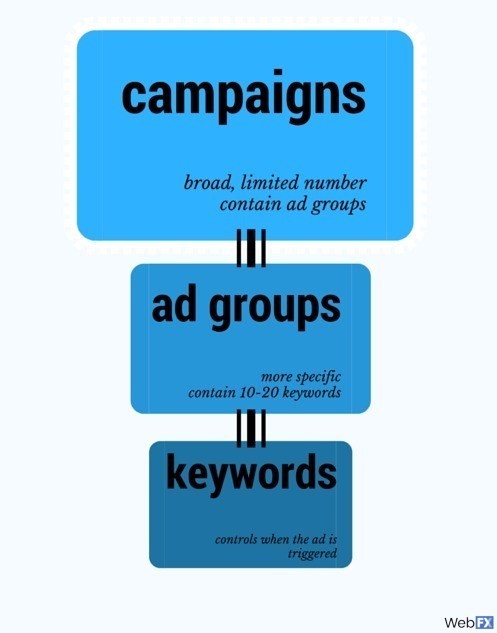
100,000+
hours of franchise marketing experience

145+
franchise marketing experts on staff
Get a dedicated account manager backed by experts in SEO, PPC, and more!
Franchise PPC: Services & Tips for Success
Whether you’re looking to grow your franchise or help your franchisees succeed, pay-per-click (PPC) advertising can play a pivotal role. That’s why franchise PPC is an essential component to the advertising strategies of franchisors and franchisees.
Franchise PPC services from WebFX
Explore WebFX’s full-service franchise PPC services below:
 Franchise PPC services
Franchise PPC services
Franchise PPC services
At WebFX, we offer several PPC services for franchisors and franchisees, including:
- PPC advertising
- Programmatic advertising
- Addressable geofencing advertising
- Competitor geofencing advertising
- Social media advertising
- Remarketing
- Google Local Services Ads
No matter which franchise PPC service (or services) you select, you will receive a custom strategy, as well as a dedicated account manager. Plus, you’ll get the expertise of more than 500 digital marketing professionals, which has helped our clients earn more than $6 billion in revenue in the past five years.
 What is franchise PPC?
What is franchise PPC?
What is franchise PPC?
Franchise pay-per-click, or PPC, is a form of online advertising that allows you to bid for ad placement on some of the most popular sites on the Internet, like Google and Facebook. With precise targeting, it can be one of the most cost-effective forms of reaching new customers.
 Franchisor vs. franchisee PPC
Franchisor vs. franchisee PPC
Franchisor vs. franchisee PPC
Franchise PPC comes with two options, which include:
- Franchisor PPC: This type of franchise PPC revolves around a centralized model. In a centralized model, the franchise’s corporate team takes an active role in the PPC campaigns of franchisees. This team reviews, approves, and funds the ad campaigns of franchisees.
- Franchisee PPC: This type of franchise PPC adopts a decentralized model. In a decentralized model, the franchisor allows the franchisee to take the lead role in managing its ad campaigns. This hands-off role requires the franchisee to develop, review, approve, and fund its PPC ads.
When talking about franchise PPC, it’s common to compare franchisor and franchisee PPC.
While franchisor PPC requires more coordination, franchisee PPC often results in off-brand ads and wasted budgets. That’s why many companies, including franchisees, prefer the centralized model because it’s guided by experienced marketers and follows the brand’s guidelines.
With the centralized model, franchisees can also focus on operating their business throughout the day-to-day, versus taking on the additional responsibility of marketing and advertising their different franchise locations.
Either way, franchisors and franchisees can take advantage of PPC management services.
Custom lead generation plans
Learn how our lead generation specialists for co-ops create custom solutions for your business.
CUSTOM PPC MANAGEMENT
Starting at
$600 / month
How we determine pricing
 Discuss your business goals
Discuss your business goals
We’ll learn about what you are hoping to achieve as a company — short- and long-term — to create an PPC plan that works towards your goals.
 Analyze your market
Analyze your market
We’ll do a deep dive into your competition — both as a business and within search, specifically — to determine the best action plan.
 Review your strategic objectives
Review your strategic objectives
What return are you hoping to achieve from your paid search strategies? Are you looking to promote a specific product- new or existing? We’ll create a plan that aligns perfectly.
INCLUDED IN ALL PLANS:
- Advanced keyword research and selection
- Competition & industry analysis
- Ad campaign initial copywriting & performance testing
- Google analytics integration & goal tracking
- Expertise of a 500+ digital strategy team
- Full-funnel ROI tracking
- Marketing and sales data unification
- MarketingCloudFX access
- Strategic bid management
- Phone, lead, and revenue tracking
Earn a 20% greater ROI with franchise marketing experts
Get more than a marketing expert, get a marketing expert in franchises. With WebFX, you’ll receive a dedicated team in franchise marketing, helping your franchise increase its marketing ROI by 20% or more.
- Fast Food Franchises
- Retail Franchises
- Cleaning Service Franchises
- Fitness Franchises
- Beauty and Salon Franchises
Solving key challenges for franchises
We aren’t driving enough traffic to our website
Skyrocket your online visibility with industry-leading digital marketing services that boost your rankings in relevant search results and drive qualified traffic to your website.

We’re struggling to attract new prospects
At WebFX, our team of strategists will help you craft revenue-driving lead generation and marketing strategies that attract high-value leads and prospects to your company.

We’re struggling to stay ahead of our competitors
Staying one step ahead of your competitors is critical for continuously attracting new customers and steady sales for your business. Our marketing services put a shining spotlight on your company to outshine the competition every time.

Our marketing efforts aren’t providing a high return
Our data-driven marketing efforts leverage data from your audience, website, strategies, and more to ensure your marketing dollars go toward the campaigns that will provide the highest ROI.
















